Chris Jones's Blog, page 14
October 26, 2017
Watch the short film ‘Rehab Matters’ that we made over summer


Watch this short film we made about healthcare and rehabilitation.
Earlier this year we shot this lovely short film about recovery after stroke, accident or other trauma. It’s called Rehab Matters and was cast and crewed largely from the team, cast and crew who also made ‘Seeing Him’.
We shot the film over two days, one day in a hospital location in central London, the second day in a house in East London.
The Hospital sequences benefited enormously from the location being large enough for us to get some real distance between the subject and camera, so we could shoot on longer lenses.
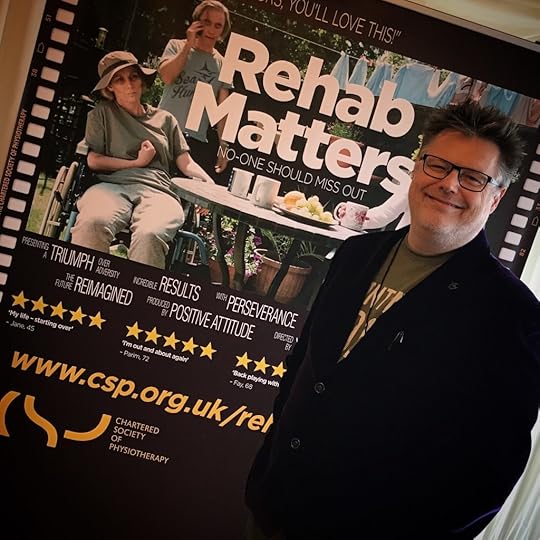 What I am personally pleased with most is the emotional impact the film delivers, something that’s always a challenge in the context of an ‘information’ film. I am also pleased that the split screen worked as well as it does as there was a great deal of ‘fingers crossed’ when we shot it. I was pretty certain it would work, but there were a LOT of shots to do, and the timing of the action on each side of the split screen needed to be co-ordinated to make the shots work and often we just had to follow instinct.
What I am personally pleased with most is the emotional impact the film delivers, something that’s always a challenge in the context of an ‘information’ film. I am also pleased that the split screen worked as well as it does as there was a great deal of ‘fingers crossed’ when we shot it. I was pretty certain it would work, but there were a LOT of shots to do, and the timing of the action on each side of the split screen needed to be co-ordinated to make the shots work and often we just had to follow instinct.
Yesterday I attended a fancy launch event at the House of Commons for MP’s and other dignitaries and now the film is officially launched. It played rather well and there were sniffles as people connected with the story. Do feel free to share and comment with the hashtag #RehabMatters.
I hope you enjoy it and I hope the message resonates somewhat.
There’s more on the site here… www.csp.org.uk/rehabmatters
Onwards and upwards!
Chris Jones
My movies www.LivingSpiritGroup.com
My Facebook www.Facebook.com/ChrisJonesFilmmaker
My Twitter @LivingSpiritPix
Sign up to my mailing list for updates on events, books and free film making tools
October 24, 2017
The Essential Low Budget Film Makers Sales Agent and Distributor Delivery List

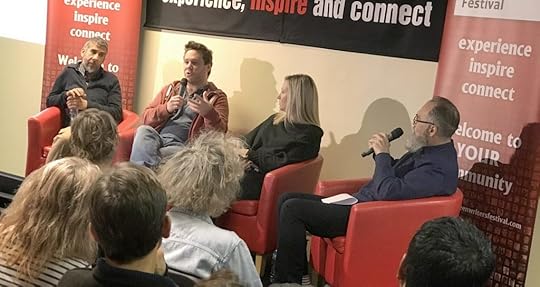
What EXACTLY will you need to deliver to your sales agents in order that they can sell your film?
We just ran the hugely successful Film Distribution Summit and as part of the weekend, we discussed sales agents delivery lists. I said I would share a list and here it is – this is by no means extensive and is also my own personal take on what a sales agent would NEED to sell you film (not what they might ask for), plus a few things that would make your life easy too.
Not all of these items will be needed by a sales agent, but most will. Some items, like the E&O policy can be negotiated around as it may never be needed depending on the sales you can secure. The cost of making up this extensive list of items could feasibly cost more than the production costs of an ultra low budget film. Speak to your sales agent and negotiate an exact list, and work out your budget for making up that list, BEFORE you sign any sales agreement.
It’s all digital now so save it in the cloud and send them links and a drive with everything on it.
Quicktime Pro Res File – Your film, fully graded and saved as either fully uncompressed or ProRes formats. Also includes the full sound mix, all channels uncompressed. You may have a stereo mix and 5.1 mix to consider also.
Quicktime H264 File – Your film, fully graded and saved as a lightly compressed H264 format file (should be around 7gb in size).
QC report – A quality control report from a reputable post facility that states that your film meets industry standards required (we usually QC to BBC standards). This is for both sound and picture.
DCP – Digital Cinema Print of your film (unlocked). A DCP can be made with high compression making it much smaller (we made on for a feature that was around 35gb and it looked fine). Do not master your own DCP at home, it will almost certainly fail.
Sound Master Mix – Saved as discrete WAV files (uncompressed).
Music & Effect Mix (M&E) – used for foreign territories to re-voice the film. Supplied as discrete WAV files.
Quicktime Pro Res File TEXTLESS – Your film, fully graded and saved as either fully uncompressed or ProRes formats WITHOUT TITLES. Also includes the full sound mix, all channels uncompressed. You may have a stereo mix and 5.1 mix to consider also.
Quicktime H264 File TEXTLESS – Your film, fully graded and saved as a lightly compressed H264 format file (should be around 7gb in size) WITHOUT TITLES.
Trailer – In ProRes, H264, and full sound mix and with textless versions too.
Stills set – 100 full colour images (NOT SCREEN GRABS) will be requested but you can get away with a handful as long as they are good.
Screenplay transcript – A script of final cut including all music cues. This isn’t your shooting script, but an accurate and detailed transcription of all the dialogue and action. You will need to sit down with a word processor and timecoded master of your film.
Distribution restrictions – statement of any restrictions or obligations (e.g. the order in which the cast are credited – unusual for low budget films but possible).
Music Cue Sheet – an accurate list of all the music cues, rights, usage etc. Used by collection agencies to distribute music royalties.
US Copyright Notice – available from The Registrar of Copyright, Library of Congress, Washington DC, 20559, USA. Apply online. https://www.copyright.gov
Chain of Title – contracts with everyone involved in the production and distribution of the film. Needed to prove that you have the right to sell the film to another party. Usually the writer, director, producer, musician, cast and release forms from all other parties involved.
Certificate of Authorship – available from solicitor. You go in, pay a small fee, swear that the information is correct, they witness it and you have your certificates.
Certificate of Nationality – available from the Department of Culture Media and Sport, Dept., of National Heritage, Media Division (Film), 2/4 Cockspur Street, London, SW1Y 5DH.
Certificate of Nationality – Apply via the BFI and is needed for the UK tax credit if you plan to claim. http://www.bfi.org.uk/film-industry/british-certification-tax-relief/european-certificate-british-nationality
Cast and Crew Contracts, Release Forms etc – All of your contracts saved as PDF files.
Credit List – complete cast and crew list, plus any other credits as an MS Word doc.
Errors and Omissions Insurance Policy (E&O) – a policy that indemnifies distributors and sales agents. Available from specialised Insurers (approx. cost £4-10k). You may be able to negotiate around this, agreeing to supply it if and when it is needed by any specific distributor.
EPK- Electronic Press Kit – ProRes Quicktime of interviews with actors and principal crew. Shots of crew at work, plus clips from film and trailer.
ArtWork – Posters, Keyart and any other artwork you have created, in multi layered PSD format and / or Adobe Illustrator (layered so that elements and text can be altered).
Sound Mix Stems – The complete sound mix of your film, usually saved as a ProTools project.
Music Soundtrack – Saved as stereo WAV files. It’s easy to supply so let them have it.
I would strongly recommend, at least in the first few years, opening a DropBox account and adding all these files to it, securing a near bullet proof cloud backup of all your master elements needed to sell your film. Of course keep local clones on a hard drive too.
Finally, remember you can start completing this list in post production and it will take many months to put it together.
NOTE – Some online platforms disallow URLs in titles, so you shouldn’t add your website or Facebook URL to the end titles. Thanks to filmmaker Brian Barnes for adding this at the Summit.
If you have any personal experiences of making delivery of a film that you think could augment, enhance or expand this list, do leave comments below.
Onwards and upwards!
Chris Jones
My movies www.LivingSpiritGroup.com
My Facebook www.Facebook.com/ChrisJonesFilmmaker
My Twitter @LivingSpiritPix
Sign up to my mailing list for updates on events, books and free film making tools
October 21, 2017
Actors And The Script: How Actors Find Their Way To Your Work #LondonSWF
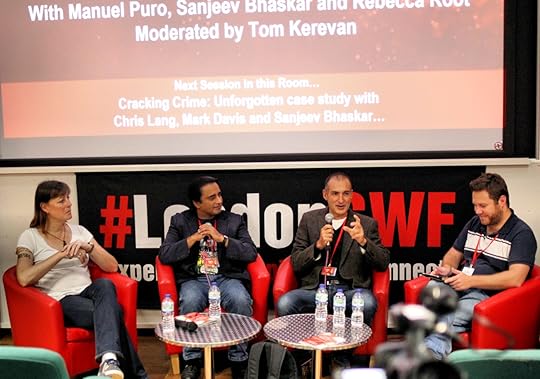
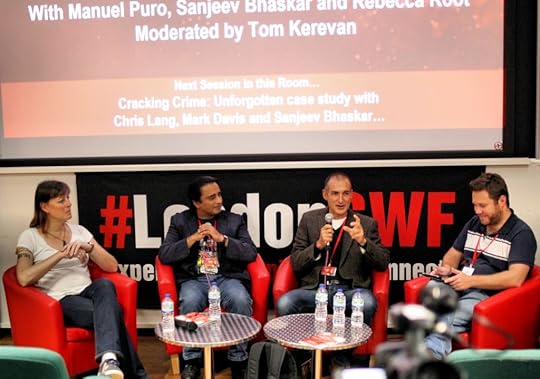
Both artistically and commercially, attracting the right talent to your project can make all the difference. Actors Rebecca Root, Sanjeev Bhaskar and Casting Director Manuel Puro sat down with Screenwriter Tom Kerevan about the process of attaching actors to a project and what people look for when seeking out screenplays.
First Steps
Before a script lands with actors it usually goes to a casting director who works with a director/producer group to find the right actors for a project. Financiers will often want to know ‘names’ have been attached to a project to try to give some investment security. The casting director will therefore look through the script initially to assess whether it will attract named actors.
Well known actors can have up to fifty scripts a week or more coming in for consideration so a lot of the initial reading work is farmed out to the agents office assistants and it’s not unheard of for work experience temps to be given the parameters by which to first judge if a script is going to be suitable for a known actor. These are eyes that the screenplay and project needs to be attractive enough to get past before it reaches any actors.
Project Appeal
From a casting director’s point of view, Manuel Puro looks at any given project to see how attractive it will be to talent, whether characters are leads or involved with the leads in the piece, what their lines are like and he usually tries to pull out interesting scenes that could be used in an audition. If he can’t pull out a meaty audition scene then he knows it’s a part he will struggle to cast a name in. Scripts with lots of great scenes and a good overall story are the desirable ones. Part of his job is questioning the desires of producers and directors as not all wishes come true and he tries not to waste too much time in pursuit of unlikely options. As a casting director he doesn’t get involved in script development but any references to other talent in a scripts character descriptors he always asks to be removed. Nobody wants to think of themselves as a budget George Clooney.
We’re always told to write great roles to attract an established actor but what a great role looks like can differ. Sanjeev Bhaskar acted in three scenes for a Woody Allen film, it was a director he really wanted to work with and it was an enjoyable experience so even though his work ended up being edited down to just one line in the final movie he didn’t care because he benefited from the process of filming. A location or production company can be a great draw too, two months in Trinidad on a Merchant Ivory production had those two draws to it aside from the benefits of the screenplay.
Of the things sent especially for Rebecca Root, the projects that have appealed to her have been work that is sensitively written, not auditioned and not a lot of time to commit to or is going be a good film to have been part of. So a lovely little short can be great to do if it’s nice and good for your work, and payment is desirable too if you’re going to cross time off your calendar.
There’s a symbiotic benefit to named actors and directors working together. Talented people like to work with other talented people. For unknown people to attract talent, business and payment reasons to take on work can really matter. Films that will have great artistic merits aside from the role you take on can have a wonderful draw to them.
Finding the Actor
The process of hiring the actor is quite functional, sending the details of the project and then waiting for the yes or the no. Manuel is careful with things like how the character ages and casting descriptions are presented so as not to prejudice an actor at the outset. Agents will vet scripts to varying levels, share details of the project with an actor and voice an opinion on whether it’s going to be good for them to take on. Acting in a cameo can be fun for most actors but nobody wants to be a glorified extra. Most actors will imagine how they will look in those scenes, whether the film is going to be an overall aesthetically pleasing or cinematic piece and whether that role or connection to it will be a good addition to their ongoing body of acting work.
Boy Meets Girl was Rebecca’s first pivotal role but she doesn’t always get roles sent specifically for her. At this point in her work she will often get sides or a script depending on what the project is willing to share and she will have to audition. When there’s limited sides and no breakdowns it’s harder but with more information it’s easier to prepare.
Why Projects Get A Pass
Sanjeev says the main reason he turns down a project is if the script doesn’t know what it is, if the tone changes suddenly. Sometimes that can be solved other times not. If an actor wants to talk about issues with the script or story and a production team is not open to their concerns it’s likely they won’t take the job. The script though is only one aspect of the film, the other actors, the director and having enough money to do justice to a project matters a lot. Actors want a good end product. The real magic is finding a project with a team that can create something that the writer couldn’t create alone. Projects not tapping into their full potential can be disheartening.
For Rebecca, lazy stereotypes are off-putting. Actors have wish lists too for the kind of work they want to do. For herself she’d love to be in a Ken Loach film so doing work that has social issues and great cinematic direction is going to be appealing to her. Also she’s open to work that may lead to more work down the line, if a part is gorgeous enough she’s happy to work through a development phase if the terms of her involvement are enough for her to be able to commit to that. Even recognisable actors aren’t always cash rich and sometimes if there’s money and you need that money then you’ll consider a role you might have discarded otherwise and try and make something good of it, but the ideal is for projects to have artistic merit, be the right fit for you and have adequate payment.
Manuel, would love for the ideal of being able to cast the right actor for a role without the star system interfering but prediction and tracking numbers in the industry make that hard. Work needs to have a chance of paying off to get funded, so actors and other known names attached to a project still have a lot of clout. It’s the sales agent you’re selling a project to, not direct to an audience so it’s what and who they think will make them money that matters. If the sales agents don’t find an audience it’s their loss so they will know what names sell for in which territories and while star names don’t guarantee an audience now as much as they used to, even a crappy film will sell on some level if it has well known names attached. Without the right package, and the right amount of thought involved in presenting it, you likely won’t get a project made or seen at all.
For those who do manage to attach great talent to their scripts it’s because they were willing to make their work appeal on multiple levels and be something that people with other choices still want to be part of. It’s those very things that attract an actor that will attract the audiences that love those actors to the work itself. Thank you to the wonderful talents in the room for sharing their insights and a little about their own work and projects in the session with us.
October 10, 2017
Six Things You Can Do Right Now To Beat Writer’s Block! #LondonSWF
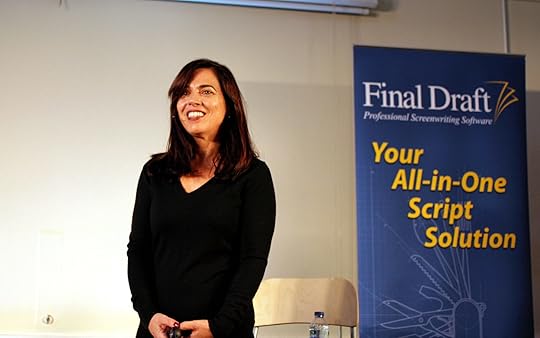

Script Consultant and educator, Pilar Alessandra joined us early in the London Screenwriters’ Festival to talk about how, even among the most employed writers in Hollywood, writer’s block can stump our writing and freeze our creative motion. If you are finding yourself blocked and can’t get to the end of a script you are likely micromanaging. Speed drafting through using the following techniques will get your story to the end and then you can go back and perfect it.
Here’s six fantastic tips from the session that you can look at right now to get your writing moving again.
Simplify Your Structure
If you’re stuck from the complexities of structure then remember the four Ts!
Trauma (Act 1) ~ Life as it was is hit by an inciting incident that will change everything.
Training (Act 2A) ~ Not always literal training, but how a protagonist copes with what they’re facing.
Trials (Act 2B) ~ How the protagonist pushes back against a problem.
Triumph (Act 3). ~ Solve the main problem of the story. Even if you’re writing a trilogy you must resolve the issue of this particular film.
This simple framework to begin structuring your story is all you need to get started, it’s the natural flow of what characters go through and most other screenplay structures will fit within it.
Crisp Up Your Characters
If your character is boring you don’t need more backstory to fix it, just think about their behaviour in the moment. Character rules that are visible on screen tell us something about them and make them more interesting. When you get notes to ‘develop’ a character you can then break a character rule as a development to show change.
Take an Antagonistic Point of View
Cliche antagonists are a common problem. Look at the script from their point of view to see how they are the hero of their actions in order to fix this issue. Similarly supporting characters are also the heroes of their story from their point of view. Writing a logline from each character perspective will grow them into more realistic forms and for ensemble TV will keep you grounded on what each characters goal is for an episode, season and entire story arc. Remember that antagonists can be big things like whole species or natural disasters too and even forces of nature will have rules of behaviour that will define how you can use them for or against your character actions in a story.
Make Scenes Sparkle
For lame scenes you feel stuck on you need to create interest and freshness to spark attention in your story. Listing the tropes of a stock scene (ie. a marriage proposal) and changing up the characters, setting or dialogue in a way that give you a fresh take. You don’t need to throw a bomb in the works every time, adding an external complication to the activity of the scene is enough. Added interest should be rooted in the genre, character traits and circumstances of your plot and get you excited about your dull scenes again.
Digg Your Dialogue
Find your character voice by giving them the language of their passion. Verbal rules that are just for them. Does one character swear a lot? Keep things like that specific to one character to differentiate personalities throughout your screenplay.
Go Backwards To Move Forward
Finding the ending and working backwards to see how we get there is a great way of getting out of story conundrums. Define the treasure, decide if they get it or give it up, and find the trigger that leads them there. Working backwards can help a lot to get you unstuck from any point in your script. Ask how you got to this point and what springs from it to ensure a flow. Bear in mind physical intention, verbal intention, emotional intention and story intention.
Whether you plug away in bite sized bits or are a binge writer you need to make a regular date for yourself to write in so make sure you do that. Pilar also has a free regular podcasts you can subscribe to with lots more screenwriting advice and details can be found at www.onthepage.tv or search On The Page podcast on iTunes.
Script Consultant and educator, Pilar Alessandra...


Script Consultant and educator, Pilar Alessandra joined us early in the London Screenwriters’ Festival to talk about how, even among the most employed writers in Hollywood, writer’s block can stump our writing and freeze our creative motion. If you are finding yourself blocked and can’t get to the end of a script you are likely micromanaging. Speed drafting through using the following techniques will get your story to the end and then you can go back and perfect it.
Here’s six fantastic tips from the session that you can look at right now to get your writing moving again.
Simplify Your Structure
If you’re stuck from the complexities of structure then remember the four Ts!
Trauma (Act 1) ~ Life as it was is hit by an inciting incident that will change everything.
Training (Act 2A) ~ Not always literal training, but how a protagonist copes with what they’re facing.
Trials (Act 2B) ~ How the protagonist pushes back against a problem.
Triumph (Act 3). ~ Solve the main problem of the story. Even if you’re writing a trilogy you must resolve the issue of this particular film.
This simple framework to begin structuring your story is all you need to get started, it’s the natural flow of what characters go through and most other screenplay structures will fit within it.
Crisp Up Your Characters
If your character is boring you don’t need more backstory to fix it, just think about their behaviour in the moment. Character rules that are visible on screen tell us something about them and make them more interesting. When you get notes to ‘develop’ a character you can then break a character rule as a development to show change.
Take an Antagonistic Point of View
Cliche antagonists are a common problem. Look at the script from their point of view to see how they are the hero of their actions in order to fix this issue. Similarly supporting characters are also the heroes of their story from their point of view. Writing a logline from each character perspective will grow them into more realistic forms and for ensemble TV will keep you grounded on what each characters goal is for an episode, season and entire story arc. Remember that antagonists can be big things like whole species or natural disasters too and even forces of nature will have rules of behaviour that will define how you can use them for or against your character actions in a story.
Make Scenes Sparkle
For lame scenes you feel stuck on you need to create interest and freshness to spark attention in your story. Listing the tropes of a stock scene (ie. a marriage proposal) and changing up the characters, setting or dialogue in a way that give you a fresh take. You don’t need to throw a bomb in the works every time, adding an external complication to the activity of the scene is enough. Added interest should be rooted in the genre, character traits and circumstances of your plot and get you excited about your dull scenes again.
Digg Your Dialogue
Find your character voice by giving them the language of their passion. Verbal rules that are just for them. Does one character swear a lot? Keep things like that specific to one character to differentiate personalities throughout your screenplay.
Go Backwards To Move Forward
Finding the ending and working backwards to see how we get there is a great way of getting out of story conundrums. Define the treasure, decide if they get it or give it up, and find the trigger that leads them there. Working backwards can help a lot to get you unstuck from any point in your script. Ask how you got to this point and what springs from it to ensure a flow. Bear in mind physical intention, verbal intention, emotional intention and story intention.
Whether you plug away in bite sized bits or are a binge writer you need to make a regular date for yourself to write in so make sure you do that. Pilar also has a free regular podcasts you can subscribe to with lots more screenwriting advice and details can be found at www.onthepage.tv or search On The Page podcast on iTunes.
October 9, 2017
100% of successful film maker cracked this problem… Distribution… Join us for the Distribution Summit 2017
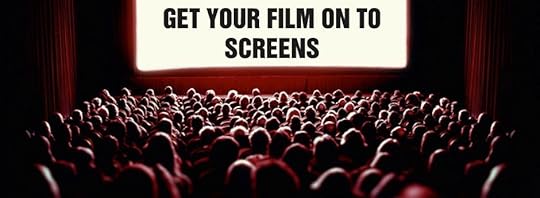

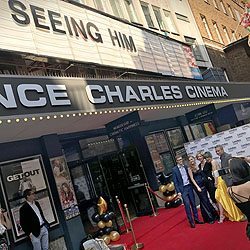 Everyone can come up with a great idea, but not everyone can make that idea into a script, then find resources and people to make that script into a film.
Everyone can come up with a great idea, but not everyone can make that idea into a script, then find resources and people to make that script into a film.
If you are reading this, then you are likely either prepping a film, or in post production. And this means that the BIGGEST hurdle still awaits.
Distribution.
And all successful filmmakers overcome this hurdle, by far the most challenging stage of their journey.
This is why I have chosen to set up this event, the Film Distribution Summit, so that the community of indie filmmakers, distributors and sales agents can come together and have an open and frank inquiry into the state of distribution, new trends, cunning tactics and proven strategies that get films, sold, seen and distributed today.
We are living through an extraordinary evolution revolution in filmmaking and distribution and we want this weekend to be a game changer for the participants and community.
We have gathered around 20 expert speakers, from filmmakers to distributors, to exhibitors… even movie poster designers… so you can learn from those who are doing it RIGHT NOW.
Join us for perhaps the most important weekend in your filmmaking / entrepreneurial journey. Passes are £139 but you can get £50 off with the code DISTRIBUTION17.
Sign up here…
https://www.filmdistributionsummit.com/tickets
And see the speakers here…
https://www.filmdistributionsummit.com/speakers/
And schedule here…
https://www.filmdistributionsummit.com/schedule/
Chris Jones
www.filmdistributionsummit.com
October 3, 2017
Producers Notes: Kill Your Darlings Without Killing Your Writing! #LondonSWF
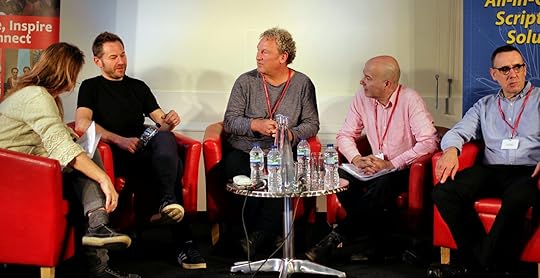

Writer’s Danny Brocklehurst, Roland Moore and Ashley Pharoah, and Producer Angus Lamont came together with Script Editor Karol Griffiths at this year’s London Screenwriters’ Festival to talk about the process of receiving script notes, what it feels like, why it happens, how you cope and what you gain.
Starting Out
For writers beginning in the industry it can be a shock to receive notes, sometimes the sheer volume of notes can be daunting and sometimes criticism and do-overs for work that you’ve toiled over, loved and carefully crafted can be disheartening. For writers who’ve struggled to get into the business the response can be really emotional. Ashley Pharoah admits feeling pressure when he started out, to incorporate absolutely all the notes he received, and Danny Brocklehurst broke a keyboard once in a moment of overwhelm. Roland Moore remembers how his first notes were funny as he was working on a children’s animation about a football playing elephant but despite the oddness of getting serious notes on this character’s motivations, he thought he had the best job in the world. Even for established writers every new project is a starting out of sorts and all the writers agree, getting notes means you’re a working writer, it’s part and parcel of what you do, and you’re given notes because your talent and craft have put you in that position. That is a wonderful place to be in.
Protecting the Work
For producer Angus Lamont, notes often mean financier notes. Lots of people can come together to get a project off the ground and at different stages, but each may have different interests and perspectives coming into the work. When a project gets moving often it’s the writer, director and producer who will come together as a triumvirate to protect the project and ensure that they use any notes to get the best version of the story they set out to tell. Ashley adds that over the years as budgets have gone up, there are more voices in the room and note wrangling can become a difficult part of the job. When you have acquired the ability to choose, then picking your team carefully and choosing those you think you work well with is important, but even new writers with less choice tend to end up gravitating more often to work with those they get along with, and it’s usually the case that you come up in the industry alongside others who began when you did. Roland points out that there’s a hierarchy of notes, sometimes they’ll conflict, and you need to know where the power lies in order to know where to prioritise. Broadcasters for instance can have a lot of clout as they’re spending the money and they have remits of their own to fulfil.
Navigating Improvements
For whatever reason notes appear, everyone has a vested interest in the work being the best it can be. Roland faced some extensive re-writes for some of his work which was tough but he tries to always understand why a note will make things better. It’s harder to write around notes you don’t believe in, and it’s then that he tries to justify his take instead, but if the notes still must be done, then one has to find a way to make them work in the story the best way you can. You have to pick your battles, let the minor things go. Danny knows sometimes you just have to be brave and throw work away to start again. He has sometimes written an alternative take on what’s been asked for that achieves the same thing, and that can work too.
You Are No Longer Alone
Producers know that notes can often be taken quite broadly and they can be really, really helpful. For a short film Angus recently produced a major dramatic element had to be changed because they didn’t have the budget to shoot it, something the new writer hadn’t considered or understood the cost and complications of. Producers, Angus says, can really help writers to understand how to write the story in a way that can be realised effectively. Discourse is important. Ashley agrees, for screenwriters he feels you really need to enjoy the collaboration and all it can do for your work, personally he loves the back and forth of it. Roland too points out that writing at first can be an isolated process but once you get into development you have lots of voices around and that has rewards.
Parameters of Production
As a writer and showrunner of many years Ashley sees how British writers have tended to be more budget restricted, but this is changing for some network shows and also with the expansion of new creative platforms like Netflix who have American sized money to spend. Notes can help you utilise available resources in ways you may not have envisioned. Certain actors might have insight into a character or a network can focus you on a target audience they want to reach. Roland points out that there are also things available to production companies and studios that you may not be aware of but could add new scope to your drama, like being told they have a submarine if you want to use it! This aspect of notes and feedback can add a new dimension to your writing and help you expand a story. At other times, knowing restrictions can force you to be innovative.
Being Specific
Sometimes, Angus tells us, in the banter and enthusiasm of talking about a project people say things they don’t really mean or haven’t entirely thought through. It’s very useful to get people on all sides to write stuff down. A written summary by them and/or you allows more thought to take place and for people to commit to a path before the team goes in that direction. Writing things down can help you speak to yourself also. Danny puts frustrating notes aside for a bit and then when he goes back to them he makes notes on the notes as to what he can and can’t do with them before beginning to work on the piece again.
Getting Along
When people talk about liking the people they work with, it needn’t always mean you have to become great friends or attend each other’s weddings etc. At a minimum though, Angus points out, you need to be able to get on with people professionally. For Roland, an important point to remember is that you’re in this process with people for the long haul, it’s a big part of your life so for your sake and theirs it helps if you get along with those you’re working with. Different individuals and companies may be more or less hands on with a project and that can vary depending on who you’re working with. Danny wrote something for Netflix recently and they’ve been quite hands off, while Karol knows someone in the same boat who’s experience was the opposite so it can be down to the individual executive how much freedom you get and whether that’s a good or bad thing for your writing. Understanding the dynamics and learning to work around it with your team in a way that boosts your own creativity and achieves the best for your project is what it’s all about.
What began as a discussion about the sometimes tricky process of receiving screenplay notes revealed a rich collaborative dynamic of working writer’s lives that felt like something to covet. One of the joys of panel discussions at the festivals is enjoying hearing writers talk to one another as well as the room. Thanks to these wonderful creatives for coming and sharing their candid thoughts and love of their work with us.
September 27, 2017
London Screenwriters’ Festival Ultra Early Bird £28 a month Ending
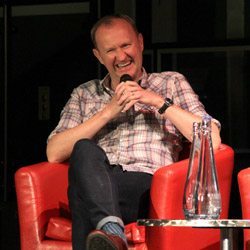
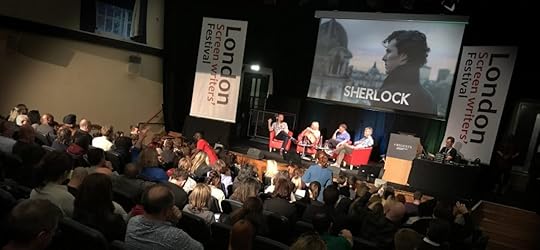
This weekend the Ultra Early Bird offer for LondonSWF will end – that offer is £28 a month for ten months, or buying you pass outright for £280.
Now the dust is settling on what we have heard has been our very best festival yet, we have fixed our sights on the future and topping it in September 2018. Is that even possible? YOU BET!
You can expect around 1,000 like minded screenwriters in attendance, world class teachers, hugely successful screenwriters, producers and actors, pitching, performances, legal advice and more … It will be like rocket fuel for screenwriters!
 And if you get your pass now, you can, as a bonus, get access to all the sessions filmed at this years festival. We will be making the Sherlock session with Mark Gatiss, Steven Moffat and Sue Vertue live very soon for instance. So you get both festivals!
And if you get your pass now, you can, as a bonus, get access to all the sessions filmed at this years festival. We will be making the Sherlock session with Mark Gatiss, Steven Moffat and Sue Vertue live very soon for instance. So you get both festivals!
And yes it’s a long time away and none of us really know if something will creep up before then, so if you need to cancel, so long as you give us 45 days or more notice, you can get a full refund. Or we can roll your pass over to the following year if you want. So you have total peace of mind.
OK, commit and come, it will change your career, writing and maybe, just maybe, even your life.
Get your pass HERE.
Whatever you choose, choose to write, choose to take the terrifying risk, choose peers that elevate you, and dream BIG!
We have one life. Make it magnificent.
Chris Jones
www.LondonSWF.com
Create50, Twisted50, Impact50 and Singularity50 Updates


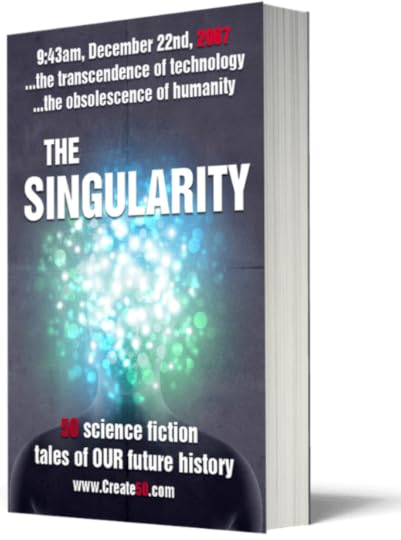 As many of you will know, the whole team has spent the last few months running the London Screenwriters’ Festival. We have now wrapped and are about to take a short break before returning to Create50.
As many of you will know, the whole team has spent the last few months running the London Screenwriters’ Festival. We have now wrapped and are about to take a short break before returning to Create50.
Right now we are doing some much needed web maintenance and migrating servers as the ones we are on are way too expensive. Create50 runs on good will and thrifty economics, so do bear with us as we make the move.
By the end of October we will have announced clear timelines for all three active Create50 initiatives with book launches for Singularity50 and Twisted50 and closing dates and editing timelines for Impact50.
If you are still redrafting your Singularity50 story, you can upload when we have moved servers. It likely wont let you do it just now. I will mail when we have moved home.
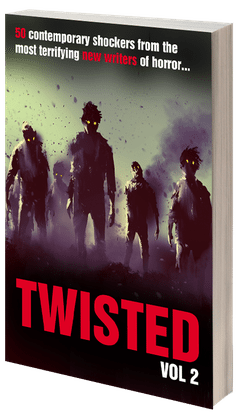 Twisted50, you may still get notes from our editing team, so if you do, take action and follow instructions.
Twisted50, you may still get notes from our editing team, so if you do, take action and follow instructions.
Singularity50 contracts have not yet been issued but will by the end of the month.
Impact50, we will be uploading and updating www.Impact50film.com over the next couple of days. If your production or information have slipped through the cracks, send us an email and we will get it fixed. Again feel free to write a blog with any on set photos attached.
OK… We are coming out of hypersleep! Buckle up!
Onwards and upwards!
Chris Jones
My movies www.LivingSpiritGroup.com
My Facebook www.Facebook.com/ChrisJonesFilmmaker
My Twitter @LivingSpiritPix
Sign up to my mailing list for updates on events, books and free film making tools
September 26, 2017
Joseph Lidster & Louis Savy: Top Tips For Writing Great Sci-Fi #LondonSWF
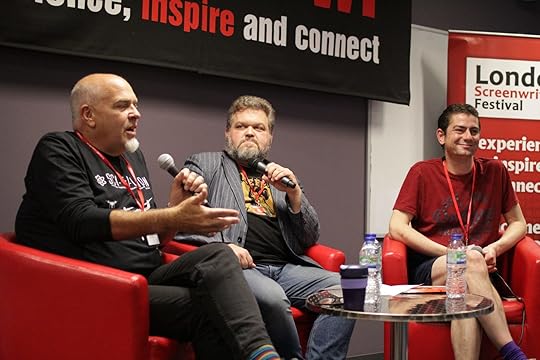
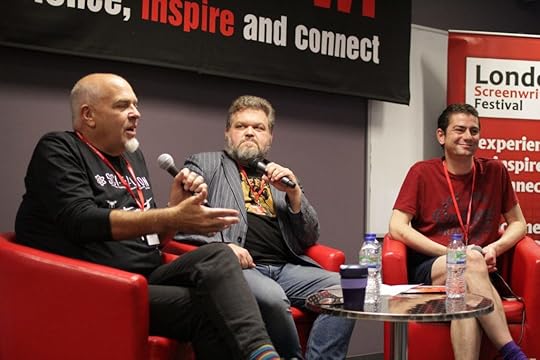
Science Fiction has, perhaps above other genres, developed a reputation for polarising audiences. But it’s true that some of the largest grossing film and TV properties (not to mention books and games) are in the Sci-Fi genre and have expanded their reach into the global psyche. It’s been said that those Science Fiction ideas which have become reality were more inspiration than prediction and there’s a truth to that. Well written Sci-Fi is stimulating the future of our society by holding a mirror up to who we are, where we might be headed, and what we could become instead.
At this year’s Screenwriters’ Festival TV/Radio writer Joseph Lidster (who writes Sci-Fi titles for all ages inc. Torchwood, The Sarah Jane Adventures, Wizards Vs Aliens and Hetty Feather) joined producer & Sci-Fi London Film Festival founder Louis Savy and screenwriting professor Bob Schultz for an in depth chat about how well crafted Sci-Fi can resonate with audiences of all kinds and to tell us their top tips for making our Science Fiction writing meaningful.
Make it Relevant
One of the most important elements in the Science Fiction Genre is that we reflect the world as it is now. In the wake of two world wars, the space race and the rise of nuclear power sci-fi films with themes of mutants, annihilation, world destruction and mind control became a way to express public anxiety without directly criticising powerful often controlling regimes. The cold war ushered in a golden age of Science Fiction movie making with over 500 Hollywood flicks being released between 1948-1962 and in the Eastern Bloc where many genres of film suspected of anti-communist sentiments were being suppressed Sci-Fi found itself to be fun escapism which also had a social voice about an uncertain future. As times change so too can the themes of a story. Different adaptations of the Invasion of the Body Snatchers have different themes based on the era in which each was created.
Use Distance To Be Objective
To get an open minded view of the present it’s often very helpful to distance ourselves and futuristic and technological settings are a great way to get perspective. Looking back from an imagined future or looking forward to the future we may be creating, gives us a safe space to examine our actions. Similarly topics of our world that may be difficult to speak to children about can find expression and resolution by cloaking ideas that are a little too gritty for young minds within supernatural or technological explanations. For adults too, things that happen in a galaxy far, far away don’t keep us awake at night but we can certainly identify with notions of oppressive regimes and the freedom fighters that oppose them.
Make it Accessible
Loss of logic, paradox, etc. are some of the things Sci-Fi is widely criticised for but only when a story fights against it’s own setting or has an impenetrable plot. World building needs to have a solid internal logic to be respected by it’s audience. Quality of production alone won’t sell an unbelievable story or character action. Far more interesting science fiction is created when we get into the trials of our society instead of merely relying on computer graphics.
Keep It Simple Sci-Fi!
Often the simplest of ideas can be something an audience, particularly a young audience, can latch onto. In Wizards and Aliens a hand marking written into the plot was a small simple thing that the schoolkid audience could draw on their own hands if they wanted. In a Sarah Jane plot about facing fears, instead of lots of boring anxty talk preaching ‘issues’ actual characters were created as a physical metaphor for those fears. A simple thing like making character names and places easier to pronounce makes a story far easier to read, write or talk about. Sci-Fi audiences, all audiences, want to be absorbed into new universes without having to struggle, so even with new languages, the less technobabble the more you will engage and the more the fans will promote the worlds and characters they love by sharing them.
Be Aware of The Zeitgeist
Writers of Science Fiction tend to be huge consumers of the genre also, and one thing to take care about is the quality of production, a lot gets made and it’s not all high calibre all the time, so it’s easy to pick up bad habits from watching too much trash TV, even if that trash TV is hugely popular. On the flipside, knowing and having seen poor TV helps you to avoid the poor bits and habits in your own work. You have to work harder to avoid falling into the easy/lazy/expected way of resolving issues.
Budget Need Not Restrict You
We all enjoy a great bit of computer graphics or special effects, especially as techniques become more realistic. But not every film that’s financed stretches to blockbuster proportions, particularly for emerging writers. However a lot of good sci-fi can and has been made on a budget and sometimes the best Sci-Fi stories are ones that people who are not fans of the genre can still relate to. Eternal Sunshine of the Spotless Mind didn’t need a lot of big effects to wow audiences. Alternate realities are great as they can be filmed in the here and now, just changing the world changes the boundaries of story, and for lower budgets, clever framing can suggest connections of imagery without showing both robotics and movement in the same shot. Sound too is a tool that can add a great deal of emotion as well as introducing elements that could be more expensive to visualise. Tony Stark maybe said it best when Steve Rogers asked him what he was without his robot suit of armour and answered, “A genius billionaire playboy philanthropist.”
To explore Science Fiction is to build your own boundaries and make up universes, it lets you play with any idea you can conceive of, sometimes from multiple angles. It can entertain and engage and amaze, it can tackle big ideas and small ones because the world fits around and serves and enriches the story themes. Telling a good sci-fi story that you want to tell is all that’s needed. Go forth and prosper!



